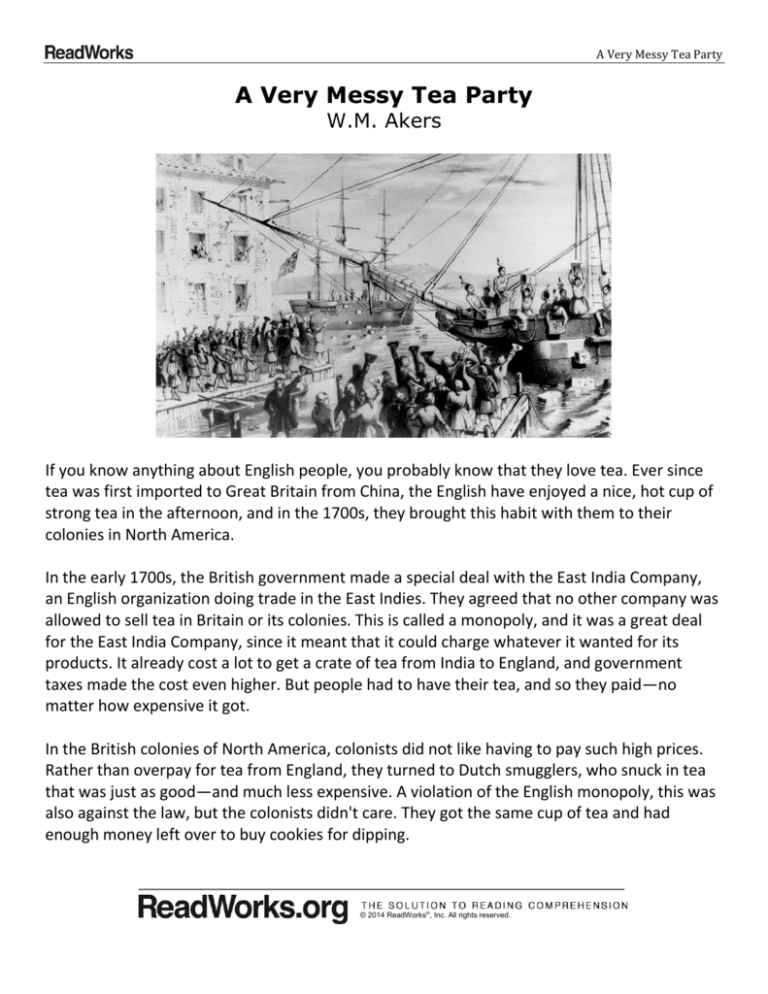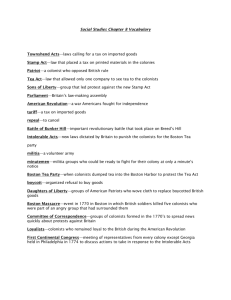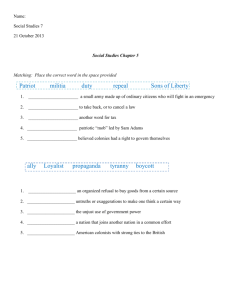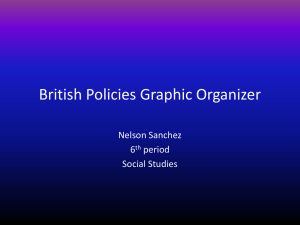
A Very Messy Tea Party
A Very Messy Tea Party
W.M. Akers
If you know anything about English people, you probably know that they love tea. Ever since
tea was first imported to Great Britain from China, the English have enjoyed a nice, hot cup of
strong tea in the afternoon, and in the 1700s, they brought this habit with them to their
colonies in North America.
In the early 1700s, the British government made a special deal with the East India Company,
an English organization doing trade in the East Indies. They agreed that no other company was
allowed to sell tea in Britain or its colonies. This is called a monopoly, and it was a great deal
for the East India Company, since it meant that it could charge whatever it wanted for its
products. It already cost a lot to get a crate of tea from India to England, and government
taxes made the cost even higher. But people had to have their tea, and so they paid—no
matter how expensive it got.
In the British colonies of North America, colonists did not like having to pay such high prices.
Rather than overpay for tea from England, they turned to Dutch smugglers, who snuck in tea
that was just as good—and much less expensive. A violation of the English monopoly, this was
also against the law, but the colonists didn't care. They got the same cup of tea and had
enough money left over to buy cookies for dipping.
© 2014 ReadWorks®, Inc. All rights reserved.
A Very Messy Tea Party
The East India Company, however, didn't like this one bit. By the 1760s, they were losing
hundreds of thousands of pounds per year to Dutch smugglers—a fortune in a time when £60
a year was considered a good income. Rather than change their prices to compete with the
Dutch smugglers, the company asked the British government for help. Parliament agreed and
in 1767, passed a law that would change the course of history.
A Tax on Tea?
With a stroke of the pen, the Townshend Revenue Act raised the prices the colonists paid on
all sorts of things. Overnight, lead, glass, paints and paper all became more expensive. But
today, the act is best remembered for raising the price colonists had to pay for tea.
The colonists were outraged, and not just because they had to spend more money at the
market. This was the second time the British government had ever directly taxed them—after
the incredibly unpopular Stamp Act of 1765—and the colonists did not think it was fair.
According to the British tradition, a tax could only be enacted—or "levied"—after elected
officials agreed on it. For people living in England, this meant that taxes had to be voted on by
Parliament. But the colonists didn't have any representatives in Parliament. They didn't have
any representatives at all.
The common phrase "No taxation without representation!" became popular then, referring to
the government taxing people without their consent. There was no legal way for the colonists
to fight back. And so they decided to break the law.
The Sons of Liberty
With the Tea Act of 1773, Parliament allowed the East India Company to sell tea to the
colonists for less money than ever before. Suddenly, English tea was cheaper than smuggled
Dutch tea, which should have made the colonists happy. But the Townshend tax was still in
effect, and colonists didn't want a shilling of their money going toward something they
considered illegal. It was a question of principle, and a few colonists in Boston were very
principled indeed.
In November, 1773, the Dartmouth, a tea ship, arrived in Boston harbor, carrying thousands of
pounds of discounted, yet taxed tea. But the people of Boston didn't want to buy this tea.
They didn't want to drink it. They didn't even want to let it off the ship. Led by Samuel Adams,
© 2014 ReadWorks®, Inc. All rights reserved.
A Very Messy Tea Party
protestors calling themselves the Sons of Liberty did everything they could to make the
captain of the ship turn around and go home. But the British governor would not let the
Dartmouth leave.
Finally, on December 16th, a few dozen colonists snuck onboard the Dartmouth wearing masks.
They dressed as Native Americans, to make it clear that their loyalty lay with North America,
and not England. Working quietly, they emptied the holds of the Dartmouth and two other
ships that had recently docked in port. 342 chests of tea went into the frigid Boston harbor—a
statement that Britain and the East India Company could not ignore. No matter how cheap the
product, if it was taxed, the colonists didn't want it.
It was more than two years after the Boston Tea Party that the Declaration of Independence
was signed, but once that tea went into the harbor, revolution was assured. The whole course
of American history was changed that night—and all for a cup of tea.
© 2014 ReadWorks®, Inc. All rights reserved.
Name:
Date:
Questions: A Very Messy Tea Party
1. What did the British government and the East India Company agree on in a deal
made in the early 1700s?
A The East India Company would lower the price of tea in Britain and its colonies.
B The East India Company would standardize the price of tea in Britain and its
colonies.
C Only the East India Company was allowed to sell tea in Britain and its colonies.
D Britain would not tax the East India Company on tea sold in Britain and its colonies.
2. One of the main causes of the high price of tea in the American colonies was the
monopoly held by the East India Company. What was the effect?
A
B
C
D
The East India Company sold more tea.
The British started buying less tea.
The East India Company grew less tea.
Colonists bought tea from Dutch smugglers.
3. The colonists’ major issue with the Townshend Revenue Act was not the higher cost
of tea. What evidence from the best passage supports this conclusion?
A
B
C
D
Colonists
Colonists
Colonists
Colonists
had to spend more money on other goods such as paper.
still would not buy British tea after the price was lowered.
dumped 342 chests of British tea into the Boston harbor.
did not have representation in the British Parliament.
4. Why did Parliament pass the Tea Act of 1773?
A
B
C
D
to
to
to
to
try to get the colonists to buy British tea again
raise the profits the British government made on tea taxes
give the East India Company a monopoly on tea
allow the East India Company to sell tea in the colonies
5. What is this passage mostly about?
A
B
C
D
why the British love high-quality tea
the beginning of the Revolutionary War
the development of the East India Company
the lead-up to the Boston Tea Party
1
© 2014 ReadWorks®, Inc. All rights reserved.
Questions: A Very Messy Tea Party
6. Read the following sentences: “It was more than two years after the Boston Tea Party
that the Declaration of Independence was signed, but once that tea went into the harbor,
revolution was assured. The whole course of American history was changed that night—
and all for a cup of tea.”
As used in the passage, what does “assured” mean?
A
B
C
D
dangerous
guaranteed
popular
unlikely
7. Choose the answer that best completes the sentence below.
________ the East India Company was able to charge high prices for tea, it was losing
hundreds of thousands of pounds per year by the 1760s.
A
B
C
D
Even though
Ultimately
For instance
In the end
8. What did the Townshend Revenue Act do?
______________________________________________________________________
______________________________________________________________________
______________________________________________________________________
______________________________________________________________________
2
© 2014 ReadWorks®, Inc. All rights reserved.
Questions: A Very Messy Tea Party
9. Why did the colonists think that taxation by the British was unfair?
______________________________________________________________________
______________________________________________________________________
______________________________________________________________________
______________________________________________________________________
10. The colonists were outraged after the Townshend Revenue Act, which raised the
price of tea. Why were the colonists not pacified by the discounted cost of tea after the
Tea Act of 1773?
______________________________________________________________________
______________________________________________________________________
______________________________________________________________________
______________________________________________________________________
3
© 2014 ReadWorks®, Inc. All rights reserved.
Teacher Guide & Answers: A Very Messy Tea Party
Teacher Guide & Answers
Passage Reading Level: Lexile 1100
1. What did the British government and the East India Company agree on in a deal made in the early
1700s?
A
B
C
D
The East India Company would lower the price of tea in Britain and its colonies.
The East India Company would standardize the price of tea in Britain and its colonies.
Only the East India Company was allowed to sell tea in Britain and its colonies.
Britain would not tax the East India Company on tea sold in Britain and its colonies.
2. One of the main causes of the high price of tea in the American colonies was the monopoly held by the
East India Company. What was the effect?
A
B
C
D
The East India Company sold more tea.
The British started buying less tea.
The East India Company grew less tea.
Colonists bought tea from Dutch smugglers.
3. The colonists’ major issue with the Townshend Revenue Act was not the higher cost of tea. What
evidence from the best passage supports this conclusion?
A
B
C
D
Colonists had to spend more money on other goods such as paper.
Colonists still would not buy British tea after the price was lowered.
Colonists dumped 342 chests of British tea into the Boston harbor.
Colonists did not have representation in the British Parliament.
4. Why did Parliament pass the Tea Act of 1773?
A
B
C
D
to try to get the colonists to buy British tea again
to raise the profits the British government made on tea taxes
to give the East India Company a monopoly on tea
to allow the East India Company to sell tea in the colonies
5. What is this passage mostly about?
A
B
C
D
why the British love high-quality tea
the beginning of the Revolutionary War
the development of the East India Company
the lead-up to the Boston Tea Party
1
© 2014 ReadWorks®, Inc. All rights reserved.
Teacher Guide & Answers: A Very Messy Tea Party
6. Read the following sentences: “It was more than two years after the Boston Tea Party that the
Declaration of Independence was signed, but once that tea went into the harbor, revolution was assured.
The whole course of American history was changed that night—and all for a cup of tea.”
As used in the passage, what does “assured” mean?
A
B
C
D
dangerous
guaranteed
popular
unlikely
7. Choose the answer that best completes the sentence below.
________ the East India Company was able to charge high prices for tea, it was losing hundreds of
thousands of pounds per year by the 1760s.
A
B
C
D
Even though
Ultimately
For instance
In the end
8. What did the Townshend Revenue Act do?
Suggested answer: The Townshend Revenue Act directly taxed the colonists and raised the prices they
had to pay for lead, glass, paints, paper, and tea.
9. Why did the colonists think that taxation by the British was unfair?
Suggested answer: The colonists thought that taxation by the British was unfair because, according to
the British tradition, a tax could only be enacted after elected officials in Parliament agreed on it.
However, the colonists didn't have any representatives in Parliament, and therefore were not able to
consent to the tax.
10. The colonists were outraged after the Townshend Revenue Act, which raised the price of tea. Why
were the colonists not pacified by the discounted cost of tea after the Tea Act of 1773?
Suggested answer: The colonists were not pacified by the discounted cost of tea after the Tea Act of
1773 because the cost of tea was not their main grievance. Their main grievance was that they had no
representation in Parliament, and therefore considered the taxation from the Townshend Revenue Act
illegal.
2
© 2014 ReadWorks®, Inc. All rights reserved.










